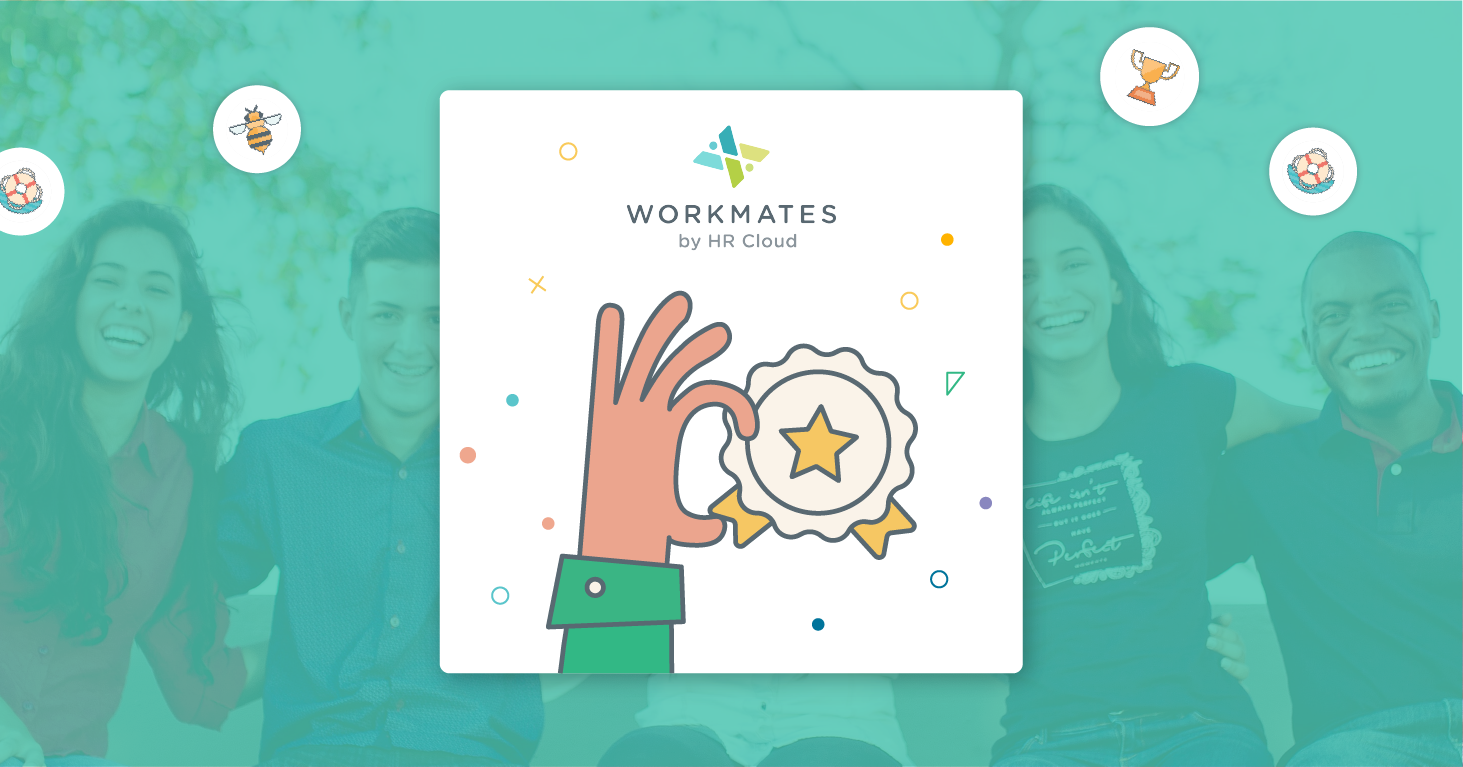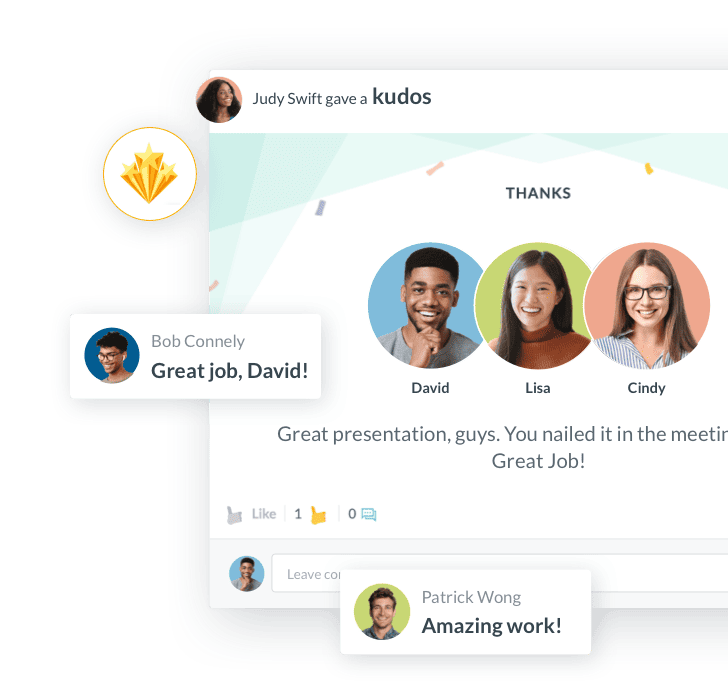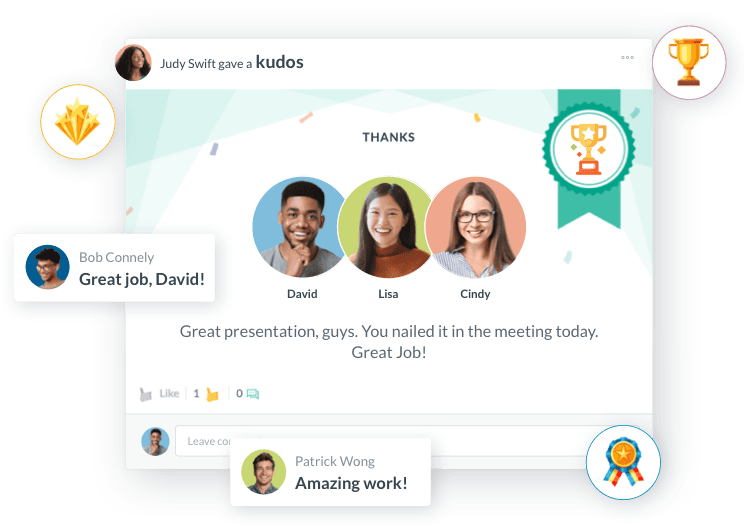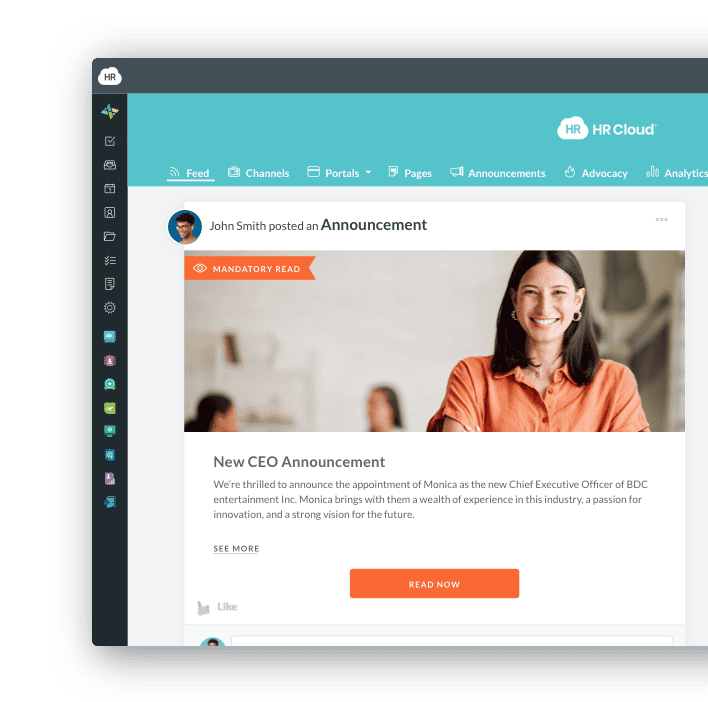12 Reasons Why You Should Be Rewarding Your Employees

- 1. Enhanced Productivity Through Recognition
- 2. Creating a Positive Workplace Culture
- 3. Strengthening Manager-Employee Relationships
- 4. Implementing Strategic Recognition Programs
- 5. Building Team Cohesion Through Peer Recognition
- 6. Increasing Employee Retention and Loyalty
- 7. Maintaining Engagement Through Consistent Recognition
- 8. Reinforcing Company Values and Desired Behaviors
- 9. Enabling Instant Recognition in the Flow of Work
- 10. Creating Positive Emotional Connections
- 11. Implementing Meaningful Rewards Systems
- 12. Strengthening Employer Brand and Recruiting
- Conclusion: Recognition as Strategic Imperative


 Cut onboarding time
by 60%—here's the
Ultimate Checklist
that helped do it.
Cut onboarding time
by 60%—here's the
Ultimate Checklist
that helped do it.

It's no longer optional—recognizing and appreciating employees' achievements is essential to building a thriving workplace. Leading a team and mentoring your employees requires more than management skills; it demands a strategic approach to recognition that drives measurable business outcomes.
When employees experience genuine appreciation through structured employee recognition programs, research shows engagement increases by 69%, and turnover drops by 31%. This isn't just about making people feel good—it's about strengthening organizational performance, building lasting employee relationships, and creating a culture where recognition becomes a competitive advantage.
Modern recognition extends beyond occasional thank-yous. With platforms like Workmates, organizations can implement peer-to-peer recognition, real-time appreciation, and rewards programs that integrate seamlessly into daily workflows. Whether your team works on-site, remotely, or in hybrid environments, strategic recognition transforms workplace culture and delivers quantifiable results.
Here are 12 evidence-based reasons why employee recognition matters more than ever in 2026:
1. Enhanced Productivity Through Recognition
When employees complete tasks with excellence and deliver exceptional results, acknowledging their contributions creates a powerful motivation cycle. According to Workhuman research, employees who receive regular recognition are five times more likely to feel valued and seven times more likely to stay committed to their work.
Recognition drives productivity by creating psychological safety and reinforcing desired behaviors. When team members know their efforts matter, they invest discretionary effort—the voluntary extra mile that separates good performance from exceptional results. Performance management systems integrated with recognition tools amplify this effect by connecting appreciation to concrete achievements.
Gallup research demonstrates that highly recognized employees show 23% higher productivity compared to their peers. This productivity boost compounds over time, as consistent recognition creates a self-reinforcing cycle of motivation and achievement.
HR Cloud Advantage: Workmates enables managers and peers to recognize achievements instantly through mobile recognition, ensuring timely appreciation that maximizes motivational impact. Learn more about building recognition into your workflows.
2. Creating a Positive Workplace Culture
Happy, recognized employees form the foundation of thriving organizational cultures. Research from the Achievers Workforce Institute reveals that nearly 80% of employees feel they belong when they receive regular, meaningful recognition.
Recognition isn't just about verbal praise—it requires tangible, visible appreciation that reinforces cultural values. Modern employee engagement platforms enable organizations to celebrate achievements through company-wide announcements, digital badges aligned with core values, and rewards that employees actually want.
When recognition becomes embedded in daily operations rather than reserved for annual reviews, workplace satisfaction increases dramatically. Employees develop stronger emotional connections to their roles, their teams, and organizational missions.
Implementation Tip: Use customizable channels to celebrate team-specific wins while maintaining organization-wide visibility for major achievements. This balance ensures recognition feels personal while reinforcing shared cultural values.
3. Strengthening Manager-Employee Relationships
The quality of manager-employee relationships directly impacts engagement, productivity, and retention. When managers consistently recognize and appreciate contributions, they build trust and psychological safety—the foundation of high-performing teams.
Gallup's extensive research shows that 80% of employees believe managers play the critical role in engagement. Recognition serves as the primary tool managers use to demonstrate they notice, value, and support their team members' work.
However, traditional recognition models that rely solely on manager-initiated appreciation miss significant opportunities. Peer-to-peer recognition programs create recognition ecosystems where appreciation flows in all directions—from managers to employees, between peers, and even from direct reports to leadership.
Strong recognition cultures eliminate the toxicity that plagues many workplaces. When employees feel comfortable speaking openly, presenting ideas, and receiving constructive feedback, organizations unlock innovation and creativity that rigid, hierarchical environments suppress.
Key Insight: The most effective recognition programs empower everyone—not just managers—to give authentic appreciation. Platforms that enable peer recognition typically see 35% improvement in employee morale (Gallup).


4. Implementing Strategic Recognition Programs
Effective recognition programs go far beyond casual compliments. Strategic programs identify top performers, reinforce desired behaviors, and create measurable business impact through structured frameworks.
Organizations with formal recognition and rewards programs report 31% lower voluntary turnover according to SHRM research. These programs work because they create consistency, fairness, and transparency around how appreciation is given and received.
Modern recognition platforms enable organizations to:
-
Align recognition with company values through custom badges and awards
-
Track recognition patterns to identify highly engaged teams and potential flight risks
-
Measure recognition ROI through engagement and retention metrics
-
Scale recognition efforts across distributed workforces through mobile accessibility
-
Integrate recognition with rewards through points-based systems tied to gift cards or experiences
The key differentiator isn't whether recognition happens—it's whether recognition is strategic, frequent, and meaningful. Research from Achievers shows 90% of employees are more likely to put in extra effort when their work gets noticed, and 92% will repeat behaviors they were recognized for.
HR Cloud Solution: Workmates Recognition enables custom badge creation, point systems with redemption options, real-time recognition feeds, and analytics dashboards that demonstrate recognition impact on key business metrics.
5. Building Team Cohesion Through Peer Recognition
Recognition's power multiplies when it extends beyond the traditional manager-employee dynamic. Peer-to-peer recognition creates workplace communities where team members genuinely appreciate each other's contributions, building camaraderie that formal programs alone cannot achieve.
Studies consistently show that peer recognition creates stronger bonds than manager-only recognition models. When colleagues acknowledge each other's efforts, it demonstrates mutual respect and creates accountability systems where everyone understands and values their teammates' contributions.
This collaborative recognition culture transforms isolated individuals into unified teams working toward shared objectives. Organizations that encourage peer recognition see 35% improvement in teamwork and collaboration metrics, as employees develop stronger interpersonal connections that improve communication and conflict resolution.
Best Practice: Enable mobile recognition capabilities that allow frontline workers, remote employees, and field teams to give and receive recognition regardless of location or schedule.
6. Increasing Employee Retention and Loyalty
Employee retention represents one of recognition's most measurable benefits. According to Gallup research, well-recognized employees are 45% less likely to have turned over two years later.
The economics are compelling: replacing an employee costs between 40% to 200% of their annual salary depending on role seniority according to SHRM. When recognition programs reduce turnover by even 10-15%, organizations save hundreds of thousands in recruitment, onboarding, and lost productivity costs.
But retention isn't just about preventing departures—it's about cultivating loyalty that drives sustained performance. Loyal employees become advocates, mentors, and cultural ambassadors who strengthen organizational fabric over time.
Timely, frequent recognition creates emotional bonds that financial incentives alone cannot match. When employees feel genuinely valued, they develop ownership mentality where organizational success becomes personal success.
Data Point: Companies with strong recognition cultures report retention rates 27% higher than organizations with weak or nonexistent recognition programs.
Calculate your employee turnover costs to understand the financial impact of improved retention through strategic recognition.
7. Maintaining Engagement Through Consistent Recognition
Employee engagement—the emotional commitment employees feel toward their organizations—directly correlates with recognition frequency and quality. Achievers research reveals that recognition increases engagement by 69% when implemented consistently.
However, traditional recognition models fail because they operate on annual or quarterly cycles. Recognition's motivational impact peaks immediately and decays rapidly, meaning monthly or quarterly recognition creates minimal sustained engagement.
The solution? Real-time, frequent recognition that acknowledges contributions as they happen. When recognition becomes woven into daily workflows through internal communication platforms, employees maintain consistent engagement rather than experiencing the peaks and valleys of periodic recognition programs.
Organizations implementing continuous recognition see employees who are six times more likely to invest in their work compared to peers who receive recognition only a few times annually according to Workhuman research.
Strategic Approach: Recognition should occur naturally throughout the employee lifecycle—during onboarding, project completions, skill development milestones, and daily contributions. This frequency creates recognition cultures rather than recognition events.
8. Reinforcing Company Values and Desired Behaviors
Recognition serves as the primary mechanism for translating abstract company values into concrete behaviors. When organizations recognize specific actions that exemplify core values, they create cultural reinforcement systems that shape behavior far more effectively than policy manuals.
Strategic recognition programs align appreciation with organizational objectives:
-
Apply recognition through branded badges that represent company values (innovation, collaboration, customer focus, etc.)
-
Create value-specific awards that celebrate behaviors that drive business outcomes
-
Feature recognition stories in company announcements and internal communications
-
Display recognition visibly through digital signage, intranet features, and team channels
This values-alignment ensures recognition drives strategic priorities rather than becoming generic appreciation that lacks business context. When employees understand exactly which behaviors earn recognition, they adjust performance to match organizational expectations.
Important Note: Authentic recognition requires specificity. Generic praise like "great job" lacks the behavioral reinforcement that makes recognition powerful. Effective recognition describes the specific action, explains why it mattered, and connects it to organizational impact.
Learn how digital signage can amplify recognition impact across locations.
9. Enabling Instant Recognition in the Flow of Work
Timing determines recognition's motivational impact. Research consistently shows that immediate recognition creates stronger behavioral reinforcement than delayed appreciation, regardless of recognition magnitude.
Traditional recognition models that require approval workflows, forms, or scheduled ceremonies miss this timing advantage. By the time recognition reaches employees, the psychological connection to the recognized behavior has weakened.
Modern recognition platforms solve this timing challenge through:
-
Mobile recognition apps that enable on-the-spot appreciation
-
Communication tool integrations that embed recognition in existing workflows
-
One-click recognition badges that require minimal time investment
-
Automated milestone recognition for birthdays, work anniversaries, and tenure achievements
This ease and immediacy transforms recognition from special events into continuous cultural practices that shape daily experiences.
HR Cloud Differentiator: Workmates integrates with communication tools employees already use, eliminating friction and enabling recognition at the moment of achievement. Recognition feeds become part of daily workflow rather than separate destinations employees must visit.
 — Andrea Bermudez, Organizational & Talent Development Manager
— Andrea Bermudez, Organizational & Talent Development Manager 

10. Creating Positive Emotional Connections
Recognition's impact extends beyond professional performance into emotional wellbeing. When employees receive sincere appreciation, it triggers neurological responses that reduce stress, increase job satisfaction, and create positive associations with work environments.
Organizations that prioritize recognition create psychologically safe workplaces where employees feel:
-
Valued for their contributions rather than treated as interchangeable resources
-
Connected to leadership and colleagues through mutual appreciation
-
Motivated to maintain high performance because they know it will be noticed
-
Comfortable taking calculated risks because failure won't eliminate past recognition
This emotional safety transforms workplace dynamics. Instead of environments characterized by anxiety, competition, or fear, recognition-rich cultures foster collaboration, innovation, and mutual support.
The cumulative effect? Employees who genuinely enjoy their work, develop loyalty to their teams, and become organizational advocates who attract top talent through positive employer branding.
Wellness Connection: Recognition programs integrate powerfully with broader employee engagement strategies that address holistic employee experience.


11. Implementing Meaningful Rewards Systems
Recognition gains additional power when paired with tangible rewards that employees value. While verbal appreciation and social recognition create intrinsic motivation, monetary rewards demonstrate organizational investment in employee success.
Research from Workhuman found that recognition with monetary rewards is 20% more effective at reducing turnover than appreciation alone. However, reward effectiveness depends on personalization and employee choice.
Modern rewards programs offer:
-
Points-based systems where recognition converts to redeemable currency
-
Gift card marketplaces with hundreds of options across categories
-
Custom company rewards like extra PTO, premium parking, or experience vouchers
-
Charitable donation options for employees who prefer giving back
-
Milestone rewards for tenure, certifications, or achievement thresholds
The key is providing choice. What motivates one employee (Amazon gift card) may not resonate with another (extra paid day off). Platforms that enable employee preference selection see significantly higher reward satisfaction than one-size-fits-all approaches.
Cost Consideration: According to research from Bersin & Associates, organizations investing 1% or more of payroll on recognition have a 79% higher success rate in achieving business goals compared to companies spending less.
Explore reward program options that balance budget constraints with meaningful appreciation.
12. Strengthening Employer Brand and Recruiting
Recognition programs create competitive advantages that extend beyond current employees. According to SHRM research, 56% of HR professionals believe recognition is vital for attracting new talent and crucial in recruitment efforts.
Strong employer brands built on recognition cultures attract passive candidates who aren't actively job searching but would consider opportunities at organizations known for valuing employees. Current employees become authentic ambassadors who share positive experiences through professional networks and social media.
This organic employer branding proves far more effective than paid recruiting campaigns. Prospective candidates trust employee testimonials about recognition-rich cultures over marketing messages. Organizations known for genuine appreciation gain access to larger, higher-quality talent pools.
Additionally, recognition directly impacts employee advocacy—the willingness of employees to promote their organizations externally. Recognized employees become voluntary recruiters who recommend their employers to talented connections, reducing recruiting costs while improving candidate quality.
Strategic Value: Your recognition practices become visible through employer review sites like Glassdoor. Positive recognition experiences translate directly into higher employer ratings that influence candidate decisions.
Learn how to build recognition into your onboarding to create positive first impressions.
Conclusion: Recognition as Strategic Imperative
The evidence is overwhelming: strategic employee recognition delivers measurable business outcomes including improved retention (31% lower turnover), enhanced engagement (69% increase), and higher productivity (23% boost). Organizations that treat recognition as cultural foundation rather than HR program outperform competitors across key metrics.
However, recognition effectiveness depends on implementation quality. Effective recognition must be:
-
Frequent: Weekly or daily rather than annual or quarterly
-
Specific: Describing exact behaviors and their impact
-
Timely: Immediate or near-immediate to maintain motivational connection
-
Fair: Distributed equitably across teams and levels
-
Meaningful: Aligned with employee preferences and values
-
Visible: Celebrated publicly to amplify cultural impact
-
Connected to rewards: Paired with tangible appreciation when appropriate
Modern employee engagement platforms like Workmates enable organizations to implement all these recognition best practices through single, integrated solutions. From peer-to-peer appreciation to rewards catalogs, from mobile recognition to analytics dashboards, comprehensive platforms eliminate the complexity of building recognition cultures from scratch.
The organizations thriving in 2025's competitive talent landscape aren't those with the highest compensation—they're those creating cultures where employees feel genuinely valued, regularly appreciated, and emotionally connected to organizational success. That cultural advantage starts with strategic recognition.
Ready to transform your recognition culture? Explore how Workmates can help your organization implement strategic recognition that drives measurable business results.
Frequently Asked Questions About Employee Recognition
Why is employee recognition important?
Employee recognition is crucial because it directly impacts engagement, retention, productivity, and organizational culture. Research shows recognized employees are 45% less likely to leave their jobs within two years and demonstrate 23% higher productivity compared to unrecognized peers.
How do I recognize employees effectively?
Effective recognition requires frequency (weekly or daily), specificity (describing exact behaviors), timeliness (immediate appreciation), and authenticity (genuine appreciation aligned with values). Use multiple recognition channels including peer-to-peer, manager-led, and organization-wide celebration.
What's the difference between recognition and rewards?
Recognition is intangible appreciation (verbal praise, public acknowledgment, badges) while rewards are tangible incentives (gift cards, bonuses, experiences). Most effective programs combine both, as research shows monetary rewards enhance recognition effectiveness by 20%.
How often should employees be recognized?
Research indicates frequent recognition (weekly or in-the-moment) creates significantly higher engagement than periodic recognition. Gallup found employees receiving recognition a few times yearly show minimal engagement improvement, while those receiving frequent recognition demonstrate 69% higher engagement.
How do recognition programs impact retention and engagement?
Recognition programs reduce turnover by 31% (SHRM) and increase engagement by 69% (Workplace Research Institute). Organizations with strong recognition cultures report retention rates 27% higher than those with weak recognition practices, resulting in substantial cost savings from reduced recruitment and training expenses.
Book Your Free Workmates Demo to see how recognition can transform your organization's culture and performance.

Keep Reading
Equity in the Workplace: A Practical Guide to Building Fairness and Opportunity
Workplace equity shouldn't be an aspiration—it should be the foundation of how
7 Employee Relations Responsibilities That Transform Workplace Culture
Employee relations shapes how people experience work every single day. It's not just
The Complete Guide to Remote Work Policy Compliance: Navigating Multi-State Tax, Legal, and Security Requirements in 2026
With 22.9% of US employees working remotely as of Q1 2024—up from 19.6% the previous year
Like What You Hear?
We'd love to chat with you more about how HR Cloud® can support your business's HR needs. Book Your Free Demo

Build a Culture of Recognition. Boost Engagement. Guaranteed.
Workmates empowers employees to stay informed, connected, and appreciated—whether they’re on the front line, in the office, or remote. Recognition drives 12x higher engagement.Trusted by industry leaders in every sector




Cut Onboarding Costs by 60%.
Take the confusion and follow-ups out of onboarding with automated workflows, digital forms, and structured portals—so new hires ramp faster 3X quicker.Trusted by industry leaders in every sector




